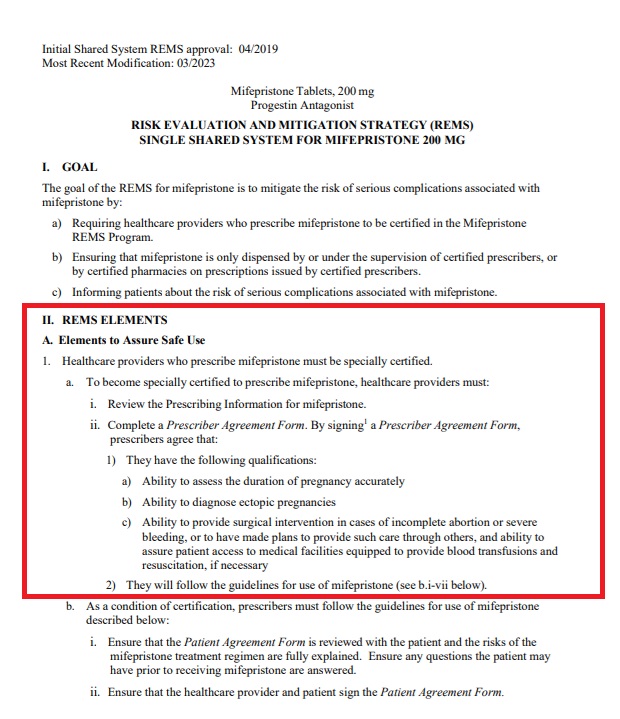The abortion industry is planning its next scheme to expand abortion pill access by suggesting pharmacists can prescribe the abortion pill, mifepristone. The move comes a year after the FDA gutted its REMS safety system for the abortion pill by announcing it would allow retail pharmacies to dispense the drug.
A report published by NPR indicates that “efforts are underway to open up access to medication abortion in a radical new way: by training pharmacists not only to dispense abortion pills but also to prescribe them to their walk-in patients.” According to NPR, Washington state isn’t the only state considering the move:
A bill pending in the New York State Assembly would grant pharmacists the authority to provide abortion medications under a “standing order” or non-patient specific prescription — the same way pharmacists administer vaccines and dispense naloxone, the opioid overdose reversal drug.
And in California, researchers at the University of California, San Diego recently reported the results of a proof-of-concept pilot study in which a pair of pharmacists safely and effectively provided medication abortions under the study protocol.
NEW: For decades, WA pharmacists have blazed a trail for the profession.
Now that pharmacies can dispense mifepristone, they're poised to notch another first–as prescribers of abortion pills.
My latest for @NPR, heroically edited by Carmel Wrothhttps://t.co/2KgEXo95tC
— Patrick Adams (@jpatadams) January 22, 2024
According to WSIU, pharmacists “say they lack sufficient knowledge of medication abortion, which is not covered by pharmacy school curricula.”
FDA Safety Regulations
Under the Food and Drug Administration’s (FDA) REMS safety system, while the FDA approved the “dispensing” of the abortion pill Mifepristone (Mifeprex) “by or under the supervision of a certified prescriber, or by a certified pharmacy on a prescription issued by a certified prescriber” they have never approved pharmacists “prescribing” the drug.
“The Mifepristone REMS Program requires that in order for patients to receive mifepristone, it must be prescribed by a certified prescriber who meets certain qualifications,” FDA’s website specifies.
“Health care providers who would like to become certified to prescribe mifepristone must review the Prescribing Information for mifepristone and must have the ability to date pregnancies accurately and the ability to diagnose ectopic pregnancies. Health care providers must also be able to provide any necessary surgical intervention or have made arrangements for others to provide for such care. Health care providers must be able to ensure that patients have access to medical facilities for emergency care…” the FDA states.
This is confirmed in the current March 2023 REMS document which also states that healthcare providers who prescribe mifepristone must have specific qualifications, to mitigate complications from the drug.

Abortion Pill Requirements under FDA REMS March 2023
But apparently this will not stop the desire of the industry to end as many preborn lives as possible and is one more example that the claim that ‘abortion is between a woman and her doctor’ is just a ruse, as the goal of this profitable industry is to allow abortion pills to be prescribed by anyone, and even available over-the-counter.
Can Pharmacists Prescribe Medication?
The American Pharmacist Association claims that, “Statewide protocols are issued by a state board or agency that authorizes pharmacists to prescribe a medication or category of medications under a protocol.”
“Although requirements vary by state, some states give pharmacists the ability to prescribe medications, modify drug therapy, give vaccines, and conduct lab tests,” reports GoodRX.
In “2015, Washington’s Gov. Jay Inslee signed a law making Washington the first state in the nation to formally recognize pharmacists as medical providers and require that they not be excluded from health insurance provider networks,” WSIU reported. “Washington’s law governing [collaborative practice agreements] CPAs is one of the broadest and most flexible, allowing the clinicians themselves to decide what to prescribe and to whom.”
Last spring, @UW professor of pharmacy Don Downing and colleagues launched the Pharmacy Abortion Access Project to provide community pharmacists in Washington with training for prescribing medication abortion. 10 pharmacists are expected to start prescribing in the next few weeks https://t.co/rbEVXwwysa
— UW News (@uwnews) January 23, 2024
Who is Pushing Pharmacy Prescribing?
Don Downing, a professor emeritus of clinical pharmacy at the University of Washington (UW), is leading the charge to open up prescribing of mifepristone to pharmacists in his state, NPR claimed.
Downing “launched the Pharmacy Abortion Access Project to provide community pharmacists in Washington with training on screening for medication abortion eligibility, prescribing abortion pills, and dispensing them from their brick-and-mortar stores — a streamlined model of care that currently exists nowhere else in the United States,” WSIU reported.
NPR noted that “There are 10 pharmacists in the first cohort, and Downing expects them to start prescribing in the next few weeks,” adding that “word is spreading… More and more calls are coming in.”
In August of 2023, Downing admitted in a University of Washington School of Public Health webinar that years prior, he and “other colleagues” at the University “initiated a small study that informed the FDA why pharmacies could dispense Mifepristone to women seeking medication abortions,” he said.
“… We used a pharmacy at the University of Washington Medical Center… And we also used a community pharmacy in Tacoma… and those pharmacists were dispensing Mifepristone to women upon orders of physicians,” he claimed.
As Live Action News previously reported, that study had some glaring issues and revealed a lack of understanding among pharmacists surrounding the risks associated with the abortion drug.
“Recently, with the Dobbs decision, the importance of pharmacists again came to mind with me about, could pharmacists prescribe medication abortion?” Downing asked himself. “And I’m pleased to say that I’m involved right now in a proposal… that would train pharmacists to provide medication abortion not just filling those prescriptions, but prescribing it.”
“We’re also working with Tribal Nations around the country in trying to provide telemedicine abortion services,” he claimed.

Don Downing leads to enable pharmacists to prescribe abortion pill
Don Downing’s Ties to Big Abortion
Downing was previous director of PEAK Solutions LLC and past board member of the Washington State Pharmacy Association and is associated with the Institute for Innovative Pharmacy Practice (I2P2) as its director.
Downing’s work also includes efforts to place the emergency contraceptive PlanB over-the-counter.
“About 25 years ago, I attended a national meeting on emergency contraception in Washington, D.C. This was shortly after the FDA approved Plan B, which was then only available with a prescription. My fellow advocates and I knew that Plan B was good, but it wasn’t good enough. We started to formulate a plan to remove that prescription barrier and make Plan B available over the counter,” Downing told UW News earlier this year.
But Downing is not just a random professor — he has long ties to Big Abortion.
Downing sits on the steering committee of the Free the Pill Coalition. a group operated by Ibis Reproductive Health and launched in 2015 thanks to a $12 million grant from the Packard Foundation, a large investor in abortion pill manufacturer Danco.
Ibis was directly funded by Danco Laboratories and is currently funded by the Packard Foundation.
Downing served for 12 years with the pro-abortion group Advocates for Youth and was a member of the Association of Reproductive Health Professionals (ARHP), according to his LinkedIn page. An archived webpage of ARHP reveals he was also a director. ARHP was originally founded as The American Association of Planned Parenthood Physicians (AAPPP) in 1963 by Planned Parenthood president Alan Guttmacher, and has gone through multiple name changes. The official journal of the ARHP along with and the Society of Family Planning is the Journal Contraception — hardly an unbiased publication.
In addition, Downing currently serves as advisor to BirthControlPharmacist.com, founded by Dr. Sally Rafie with help from a grant from the Society for Family Planning. That organization also offers continuing education courses to pharmacists for medication abortion.
Downing is a recipient of the Felicia Stewart Award for Lifetime Achievement. Stewart founded the pro-abortion Advancing New Standards in Reproductive Health (ANSIRH) which publishes workbooks on abortion training. Stewart was previously awarded by the eugenics founded Population Council, which brought the abortion pill to the United States and set up Danco. Stewart also served on the executive committee of the ARHP, boards of NARAL and the National Abortion Federation and was medical director and staff physician at Planned Parenthood facilities in California.
Downing has conducted research with funding from “agencies such as the U.S. Agency for International Development, the National Institutes of Health, Advocates for Youth and the Packard Foundation” UW News claimed.
In 2019, Downing signed an open letter which advocated that “medication abortion would be widely available in the United States without medically unnecessary restrictions on distribution.”
Downing is employed by the University of Washington (UW) which is funded by the Buffett and Packard Foundations. UW’s programs dispense the abortion pill and commit first- and second-trimester surgical abortions at the Women’s Health Care Center at UW Medical Center – Roosevelt.
The University also offers “[t]eaching and mentoring skills through engagement with the Ryan Residency Training Program” and “Training in complex contraception and abortion care through the Family Planning Fellowship.”
Media reports indicate that Downing plans to guide “pharmacists through a ‘no-test’ protocol designed for evaluating patients remotely, without the need for ultrasound, pelvic exam or bloodwork.”
But that “protocol” does not have the woman’s best interests in mind.
Instead, “no-test” eliminates all labs, bloodwork, and testing, and can result in missing potentially dangerous ectopic pregnancies, failing to identify RH negative blood, and prescribing the drug well past FDA limits, when failures are statistically greater.







